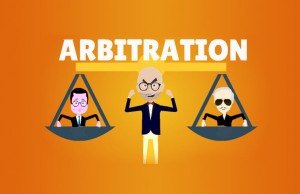In this blog post, Nabarun Roy, Superintendent of Central Excise and Customs, Export Refund Section, Central Excise, Kolkata – I Commissionerate, Kolkata under the Dept. of Revenue, Ministry of Finance, Government of India, who is currently pursuing a Diploma in Entrepreneurship Administration and Business Laws from NUJS, Kolkata discusses about the security for cost that is incurred while conducting an arbitral proceeding.
Introduction
The winning party, in arbitration proceedings, is usually entitled to its costs on the application of the general principle that ‘costs follow the event.’ However, there is always a risk factor that such costs could remain unpaid. To minimize such risks for a winning respondent, an order may be obtained in some situations during the proceedings whereby the claimant is required to provide security for some or all of the respondent’s projected costs. This order is referred to as “security for costs.” For security for costs, costs in arbitration should always be understood as the legal costs of the parties as well as the arbitrators’ fees and expenses, fees and expenses of the arbitral institution (if there is any) and any other costs (non-legal) of the parties.
Costs of Arbitration
 To fix the security for costs, the arbitrator must first ensure that s/he has the necessary power to order security for costs. The powers of the arbitral tribunal are those conferred by the parties as evinced from the Arbitration Agreement subject to the fact that such powers are operating within the limits allowed by the applicable laws. The applicable law will usually be the proper law of the arbitration agreement and the law of the place of the arbitration, i.e., the Lex arbitri. In India, the prevalent act in this regard is the Arbitration and Conciliation Act, 1996 (A&C Act). Based on the powers given under the Act and the Arbitration Rules of the Indian Institute of Arbitration & Mediation (IIAM Rules), the Indian Institute of Arbitration & Mediation (IIAM), for an example, details the costs of arbitration under Rule 53 as:
To fix the security for costs, the arbitrator must first ensure that s/he has the necessary power to order security for costs. The powers of the arbitral tribunal are those conferred by the parties as evinced from the Arbitration Agreement subject to the fact that such powers are operating within the limits allowed by the applicable laws. The applicable law will usually be the proper law of the arbitration agreement and the law of the place of the arbitration, i.e., the Lex arbitri. In India, the prevalent act in this regard is the Arbitration and Conciliation Act, 1996 (A&C Act). Based on the powers given under the Act and the Arbitration Rules of the Indian Institute of Arbitration & Mediation (IIAM Rules), the Indian Institute of Arbitration & Mediation (IIAM), for an example, details the costs of arbitration under Rule 53 as:
- The arbitral tribunal shall fix the costs of arbitration in its award. The tribunal may apportion such costs among the parties if it determines that such apportionment is reasonable, taking into account the circumstances of the case.
- The Arbitral Tribunal shall specify in the award, the total amount of the costs of the arbitration. Unless the parties agree otherwise, the arbitral Tribunal shall determine the proportions in which the parties shall pay and specify as to who is entitled to costs and as to who shall pay the costs.
- If the arbitration is abandoned, suspended or concluded, by agreement or otherwise before the final award is made, the parties shall be jointly and severally liable to pay the costs of the arbitration as determined by the arbitral Tribunal. If the costs so determined are less than the deposits made, there shall be a refund in such proportions as the parties may agree, or failing agreement, in the same proportions as the deposits were made.
The Arbitrators should consider whether there are reasonable grounds for concluding that there exists a serious risk that the applicant will not be able to enforce a costs award in its favor because:
- the claimant will not have the funds to pay the costs awarded;
And
- the claimant’s assets will not be readily available for an effective enforcement against them.
Factors which arbitrators should bear in mind while considering whether to make an order for security for costs may be given as:
- Whether the claimant has any available or reachable assets within or without the jurisdiction, and as a consequence, whether there is a real prospect that the claimant would be unable to pay, or may be able to avoid paying the respondent’s costs if called upon so to do?
- Whether the Respondent is using the application as a weapon against a weaker party, thereby creating the risk that the claimant will be unable to continue with the arbitration and therefore have to abandon his possibly meritorious claim?
- What are the effects of the respondent’s behavior on the claimant’s want of means?
- Whether there is any justification in the timing of the application?
- Whether the order is appropriate in the light of the specific nature of the arbitration?
- Whether it would be fair and just under the given/all circumstances of the case to make an order for security for costs?
Again, certain other factors, which should only be taken into account in exceptional circumstances when deciding whether to make an order for security for costs may be given as:
- The possibility/likelihood of the claimant absconding without having paid the amount that may be awarded against him.
- The beneficiary of the claim.
- The merits of the case and the prospect of success.
- Any offers that the respondent might have made either before or during the arbitral proceedings.

If the arbitrators conclude that, for either or both of these reasons, there is a real risk that the applicant will be having difficulty in enforcing a costs award, then these factors favour an order for security, unless these factors were considered and accepted as part of the business risk at the inception of the parties’ relationship. Conversely, if the arbitrators conclude that the claimant has assets that will likely enable the applicant to pursue enforcement of a costs award and that these assets will be readily accessible to the applicant, then there is no justification for an order for security.
In general, orders requiring security frequently provide that the claim cannot proceed until the security is provided, hence failure to comply can have adverse consequences. Accordingly, great care has to be taken by the arbitrators before making such an order to avoid any injustice, including, in particular, unjustly stopping genuine claims by impecunious parties.
Dealing Expeditiously while dealing with Applications for Security
It should also be mentioned that arbitrators should deal with applications for security for costs in an expeditious manner. Often a four-step process is appropriate:
- If the application is at the very start of arbitration, the arbitrators should begin by considering whether they have jurisdiction to hear the dispute or not;
- If they decide, or have already decided, that they have jurisdiction they should then consider whether they have the power to order security for costs taking into account any requirements and limitations expressly stipulated in the arbitration agreement, including any arbitration rules, and the applicable national law in this regard;

- If they decide that they have the power to order security for costs, they should exercise their discretion to decide the process for hearing the application and in doing so they should, as always, ensure that both parties are given a fair opportunity to present their case; and finally
- The arbitrators should always consider the merits of the application have due regard to all of the relevant circumstances of the case and without any predisposition for, or against, the application.
While considering this issue, arbitrators have to be extremely careful not to pre-judge or pre-determine the merits of the case itself and should make it clear to the parties that they have not done so. Because as is said that Justice should not only be done, it should also be seen to have been done. The danger is that, if the arbitrators consider the merits of the case before the substantive hearing, they may compromise their impartiality and may disqualify themselves from proceeding further. Arbitrators should not consider the merits in detail, as it is unlikely that there will be adequate materials to do so and it would be a time-consuming and expensive exercise. Instead, they should limit their preliminary examination to determine whether there is a prima facie claim made in good faith and a prima facie defense made in good faith.
Conclusion
In this paper on security for costs, I have only tried to cover some of the issues which should be considered in an application for security for costs. While it is understandable that there are no definitive answers. It is solely upon the arbitrator to ensure that the conundrum between the claimant’s rights to access to the tribunal is properly balanced with the successful respondent’s right to be protected from the risk of non-payment of its awarded costs within the purview of the jurisdiction of the arbitral tribunal, legitimate exercise of the tribunal’s powers and the applicable laws.
 Serato DJ Crack 2025Serato DJ PRO Crack
Serato DJ Crack 2025Serato DJ PRO Crack










 Allow notifications
Allow notifications


